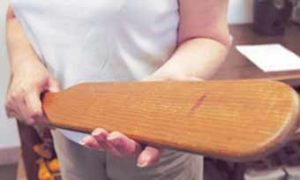Most schools across the country have stopped the old-fashioned practice of paddling children for their bad behavior. But public schools across the state of Alabama are still paddling away, delivering a whack on the behind to one student every four minutes.
This is according to newly released data from the U.S. Department of Education’s Office for Civil Rights, which reported that nearly 19,000 Alabama public school students were paddled during the 2013-2014 school year. The alarming total accounts for individual students who were paddled, but doesn’t indicate those who were paddled multiple times.
Alabama is one of few states whose laws explicitly give adults the authority to administer corporal punishment, AL.com reports. The U.S. Supreme Court upheld the right of public schools to dish out corporal punishment to students in 1977, but many schools across the nation have since declined to use physical punishment as a form of discipline.
Growing piles of research and evidence pertaining to the negative impact of corporal punishment on student attitudes and achievement have also led children’s advocacy groups to call for a ban on such forms of discipline.
But that still hasn’t stopped Alabama.
“I don’t anticipate this being the focus of change that Alabama needs to move our student achievement higher,” said Rep. Terri Collins, who also serves as chair of the Education Policy committee in the Alabama House of Representatives, AL.com reports. “As a child paddled, and as a parent who paddled, I’ve not experienced the negative side of corporal punishment personally, only the positive side.”
But the newly released data shifts focus from the effects (positive or negative) of corporal punishment on students to specifically which students are being punished and why. According to AL.com, the numbers revealed disproportionate usage of paddling on boys — African-American boys to be exact.
For instance, the data showed Black males made up just 24 percent of the population at public schools that paddle, yet account for 35 percent of male students paddled. Black males also make up 38 percent of total students paddled nationwide, AL.com reports.
Racial disparities between the use of corporal punishment on African-American girls was high as well. According to the data, Black girls accounted for a quarter of the female population at schools that paddle; but nearly half the girls who got paddled were Black.
A similar report highlighting racial disparities in the administration of corporal punishment was released by the Brookings Institution in January of this year, Atlanta Black Star reports. The institution also used data from the Department of Education’s Office for Civil Rights, but examined numbers from the 2011-2012 school year.
According to their report, Black students in the South were twice as likely to receive corporal punishment. The disparities were most disturbing in Mississippi, where Black students were 70 percent more likely to be physically punished than their white counterparts. The probability of a Black student being beaten was 40 percent higher than a white student in Louisiana, Atlanta Black Star reports.
In addition to corporal punishment, African-American students also experience higher rates of in-school and out-of-school suspensions.
“Every time a child is beaten in school and every time one is suspended and thus loses learning time, something or someone has failed that child along the way, regardless of the ‘reason’ for the punishment,” said writer Dirk Startz. “So long as these failures fall disproportionately on black children, we are not yet living up to the dream that ‘children will one day live in a nation where they will not be judged by the color of their skin but by the content of their character.’ ”
AL.com reports that there are currently no studies showing improvements in student achievement after the banishment of paddling, which may be why Alabama continues the practice.



